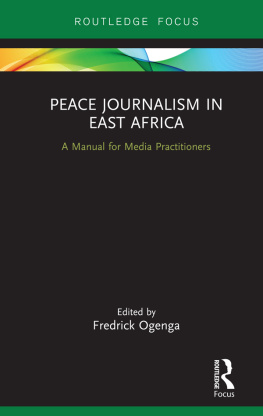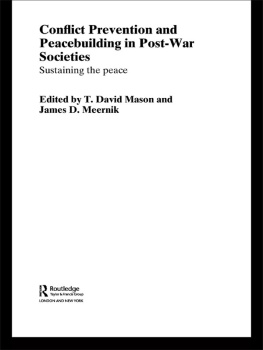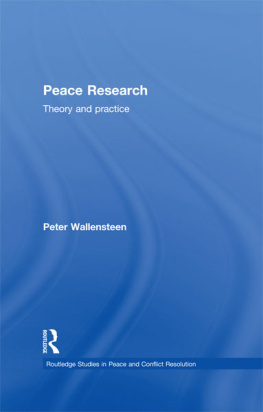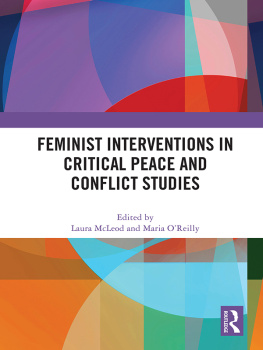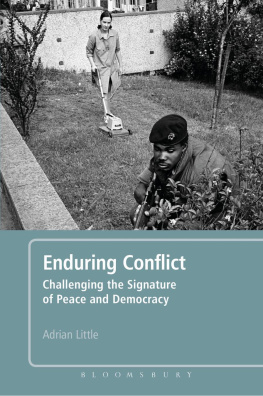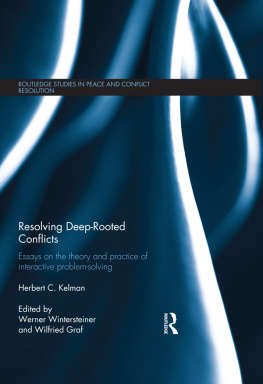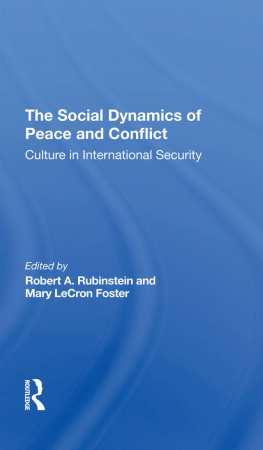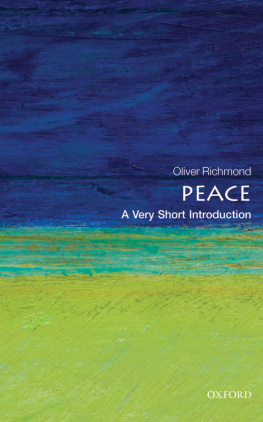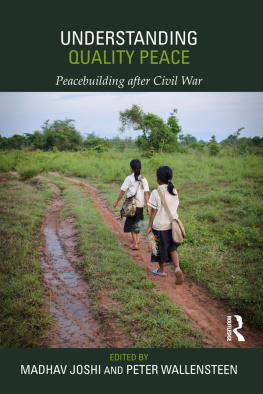
Pathways of Peace
This book explores the close interconnection that exists between sociological and philosophical scholarship in relation to peace studies. Through an examination of the thought of nine leading philosophers and sociologists in their historical and geographical context, the author considers notions of nonviolent resistance, pacifism and reverse strike, as well as violence theories of conflict, theories of conflict resolution, the problem of war, and political transitions towards democratization. Engaging with the work of Thoreau, Gandhi, Ghaffar Khan, Capitini, Dolci, Bobbio, Galtung, Sharp and Weil, and considering the institutionalization of peace research, this volume will appeal to scholars and students of sociology, politics and philosophy with interest in peace and security studies, and conflict.
Romina Gurashi is Assistant Professor of Sociology at Sapienza University of Rome, Italy, and the co-author of Historic and Sociologic Reasons for the Transformation of Abkhazias Ethnic Confl ict and From Intractability to Appeasement: A Federal Perspective on the AbkhazGeorgian Conflict.
First published 2019
by Routledge
2 Park Square, Milton Park, Abingdon, Oxon OX14 4RN
and by Routledge
711 Third Avenue, New York, NY 10017
Routledge is an imprint of the Taylor & Francis Group, an informa business
2019 Romina Gurashi
The right of Romina Gurashi to be identified as author of this work has been asserted by her in accordance with sections 77 and 78 of the Copyright, Designs and Patents Act 1988.
All rights reserved. No part of this book may be reprinted or reproduced or utilised in any form or by any electronic, mechanical, or other means, now known or hereafter invented, including photocopying and recording, or in any information storage or retrieval system, without permission in writing from the publishers.
Trademark notice: Product or corporate names may be trademarks or registered trademarks, and are used only for identification and explanation without intent to infringe.
British Library Cataloguing-in-Publication Data
A catalogue record for this book is available from the British Library
Library of Congress Cataloging-in-Publication Data
Names: Gurashi, Romina, author.
Title: Pathways of peace : the philosophy and sociology of peace and nonviolence / Romina Gurashi.
Description: Abingdon, Oxon ; New York, NY : Routledge, 2019. | Includes bibliographical references and index.
Identifiers: LCCN 2018021583| ISBN 9780815377870 (hbk) | ISBN 9781351233620 (ebk)
Subjects: LCSH: Nonviolence. | Peace.
Classification: LCC HM1281 .G87 2019 | DDC 303.6/1--dc23
LC record available at https://lccn.loc.gov/2018021583
ISBN: 978-0-8153-7787-0 (hbk)
ISBN: 978-1-351-23362-0 (ebk)
It is with simple and sincere gratitude that I say thank you to my two mentors Roberta Iannone and Maria Cristina Laurenti for instilling in me a passion for research and a determination to pursue my dreams.
Thanks also to Alessandro and Hoze for supporting me in every step, and to my beloved mother Ermelinda and my beloved father Kol for always being there for me.
Dealing seriously with peace and nonviolence issues is crucial today. In a world suffering from conflicts, where indicators of global peace have decreased by 2.14% since 2008, where safety and security issues have registered a negative trend of 61% in countries suffering from deteriorating conditions of peace, where violence has cost almost $1.04 trillion (USD), or 12.6% of world GDP,1 defeatist and passive stances cannot be adopted.
There is a need to choose an appropriate understanding of such phenomena if we want to have an impact on them. Knowing the history and paths of development of the concepts of nonviolence and peace, understanding their historical, politico-philosophical and sociological evolution is the only way to discover the instruments needed to change the reality. We too often forget that mankind, together with its aspirations, choices, beliefs, symbols and religiosity, is the only one who can shape reality and fill it with meaning. Reality is the result of actions taken by men and women, on the basis of their knowledge, intuitions and experience. Such choices can have consequences not only for those individuals but also for their groups, their communities and society as a whole. Just as the circular waves emanating from a stone thrown in water become wider and wider while decreasing in their intensity, the aftermaths of the actions and choices we make can spread within society.
In this perspective, understanding how individuals see and live reality is as important as understanding the political mechanisms and power relations of the international community. Therefore, far from being abstractions, peace and war are constructs we create through our actions, conditioned by culture, traditions, beliefs, religions and so on. This means that peace and war are the expression of human action, both individual and collective, and are not abstract phenomena belonging only to the sphere of the intelligible.
This work is aimed at analyzing how ways of considering peace and war both at an individual and at a collective level have changed, by studying social movements and ideas of some of the main contemporary philosophers and sociologists. The objective is to show the close interconnection between research in the fields of sociology and philosophy and peace studies. Although some researchers in peace studies have asserted in general terms how strongly the study of peace is interconnected with philosophy, history, economics and psychology, currently there is no methodical study of the points of contact between philosophical and sociological theories in the field. This extensive study (extensive from the point of the number of authors considered) is intended to fill this gap. Through the analysis of the theories, ideas and actions of nine important historical figures Henry David Thoreau, Mohandas Karamchand Gandhi, Abdul Ghaffar Khan, Simone Weil, Aldo Capitini, Danilo Dolci, Johan Galtung and Gene Sharp I will demonstrate the genesis and current developments of the concepts of nonviolence and peace, both in a philosophical and a sociological perspective. The aim therefore is to identify the pathways of nonviolence and peace that periodically interweave but frequently proceed in parallel directions in these authors.
The first chapter will focus on the concepts of civil disobedience and nonviolence in Henry David Thoreau, Mohandas K. Gandhi and Abdul Ghaffar Khans writings and ideas contextualizing them in terms of abolitionism in the United States and the independence movements in Asia. The second chapter will investigate the European matrices of peace and nonviolence, which will be described through an analysis of the ideas of Simone Weil on the problem of war, Aldo Capitini on religious nonviolence, Danilo Dolci on the reverse strike and Norberto Bobbio on institutional pacifism. Subsequently in the third chapter we will focus on the heterogeneous development of the approaches to research in this field and on the origins of the first academic institutions oriented to the study of peace. The fourth and the fifth chapters will then be devoted to a brief analysis of the two leading contemporary authors on peace and nonviolence: Johan Galtung, a European sociologist concerned with the study of peace, violence and conflict transformation; and Gene Sharp, an American philosopher whose main activity was in the field of nonviolence and civil resistance.


